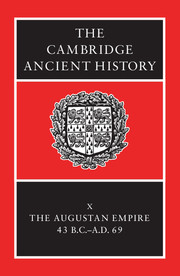16 - The place of religion: Rome in the early Empire
from PART IV - ROMAN SOCIETY AND CULTURE UNDER THE JULIO-CLAUDIANS
Published online by Cambridge University Press: 28 March 2008
Summary
Roman religion had always been closely linked with the city of Rome and its boundaries. The restructuring of a number of religious institutions in the Augustan period resulted in changes within Rome, and, beyond it, in the empire. The importance of the religion of place is illustrated by an episode from Livy's History of Rome, written in the early 20s B.C. After the sack of Rome by the Gauls in 390 B.C., there was a proposal that the Romans should migrate to the newly conquered Veii, rather than rebuild Rome. Livy put in the mouth of the Roman general Camillus a striking rejection of this proposal, which emphasized the religious foundation of the city, the necessity for the ancient cults to be located in Rome, and the significance of Rome's sacred boundary, the pomerium (V. 52). Camillus' speech articulated issues of considerable topical importance. There had been a fear that Caesar would move the seat of empire from Rome to the East, a fear that was revived by Antony's dalliance with Cleopatra. Augustus, however, was to promote Rome as the capital of the empire. Camillus' re-establishment of the ancestral rites neatly foreshadows the religious activity of Augustus himself and his argument about the indissoluble ties between Rome and her cults encapsulated the preoccupation of the imperial age with place and the associated issue of boundaries (see below, Section I).
Stress on the religious site of Rome was not an innovation of the Augustan age, but it did increase in this period and it formed the content within which the new political order was placed (see below, Section II).
- Type
- Chapter
- Information
- The Cambridge Ancient History , pp. 812 - 847Publisher: Cambridge University PressPrint publication year: 1996
References
- 4
- Cited by

